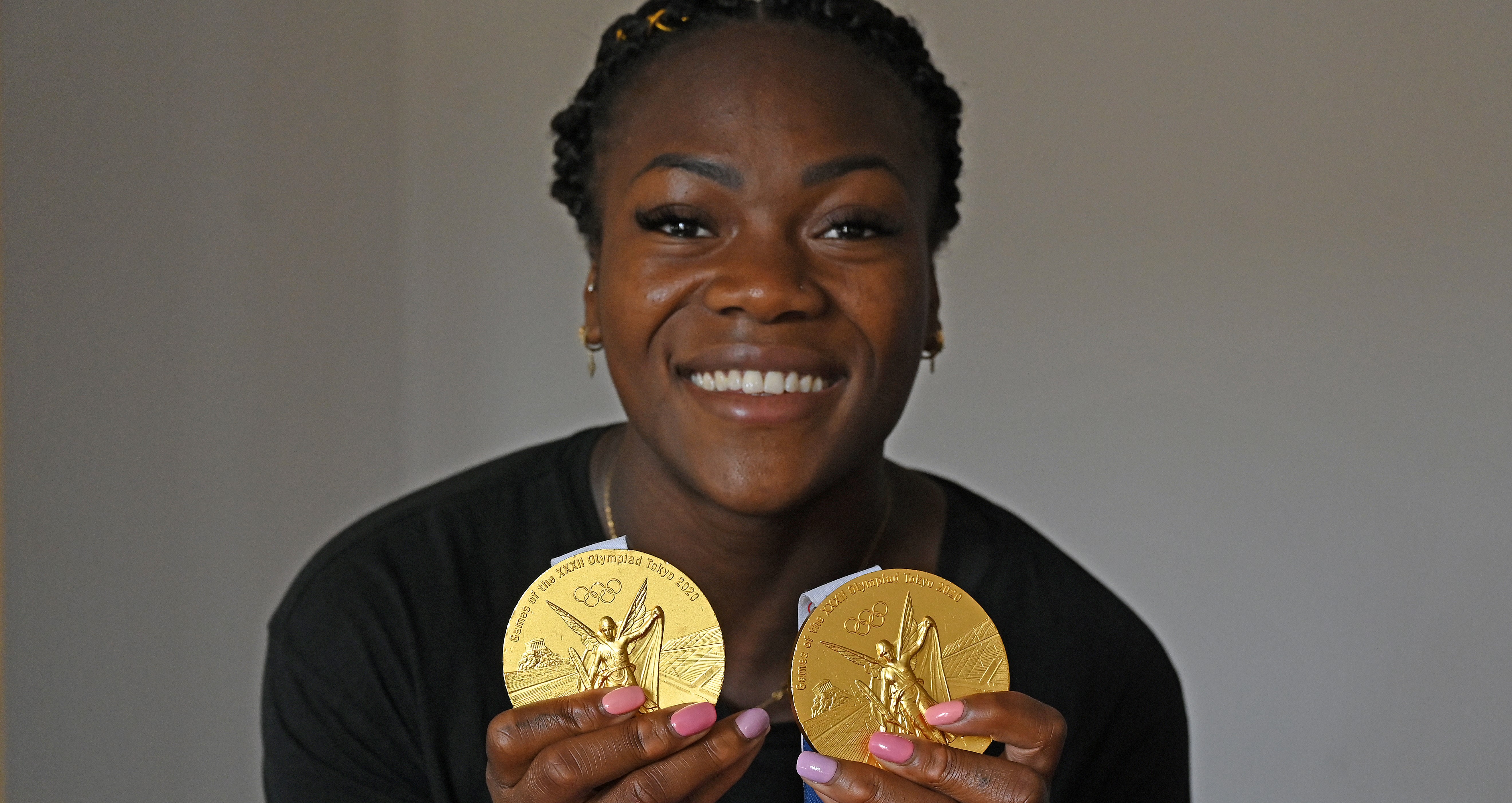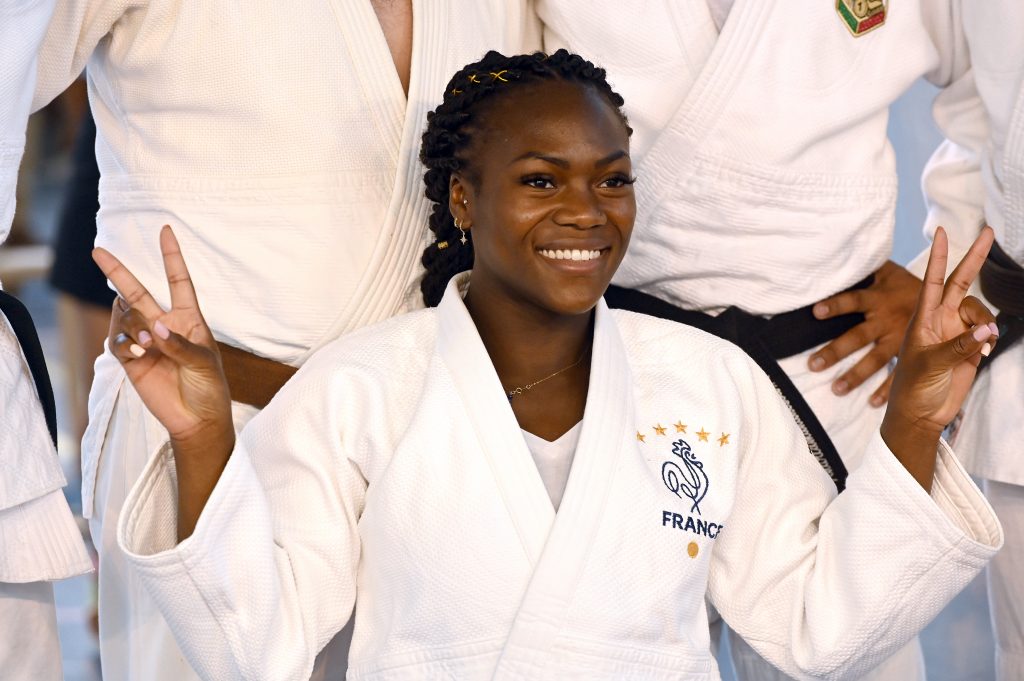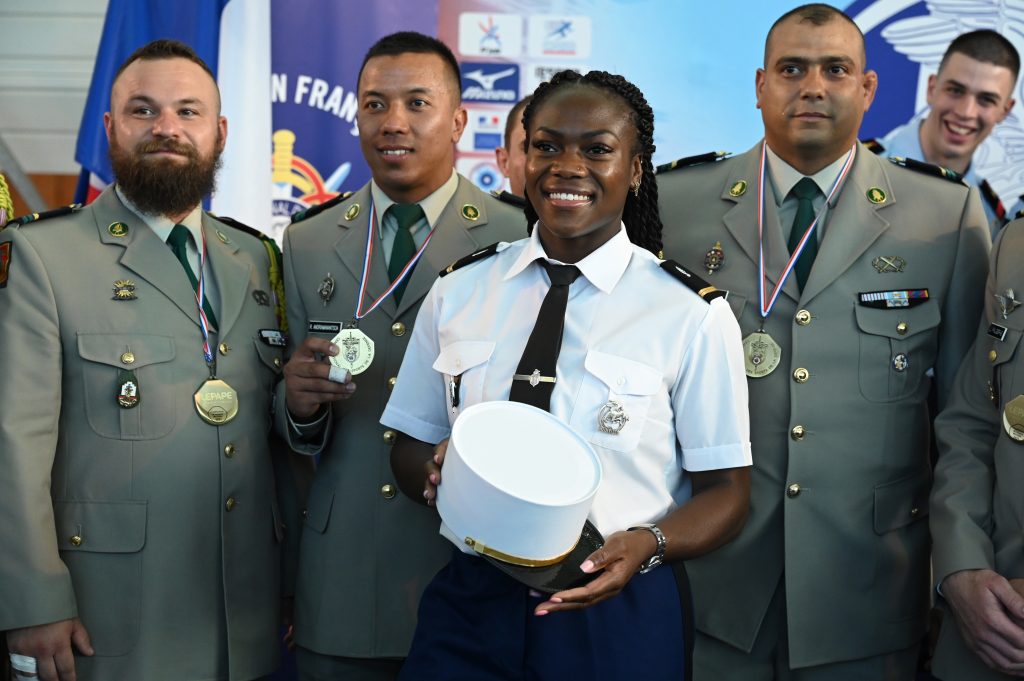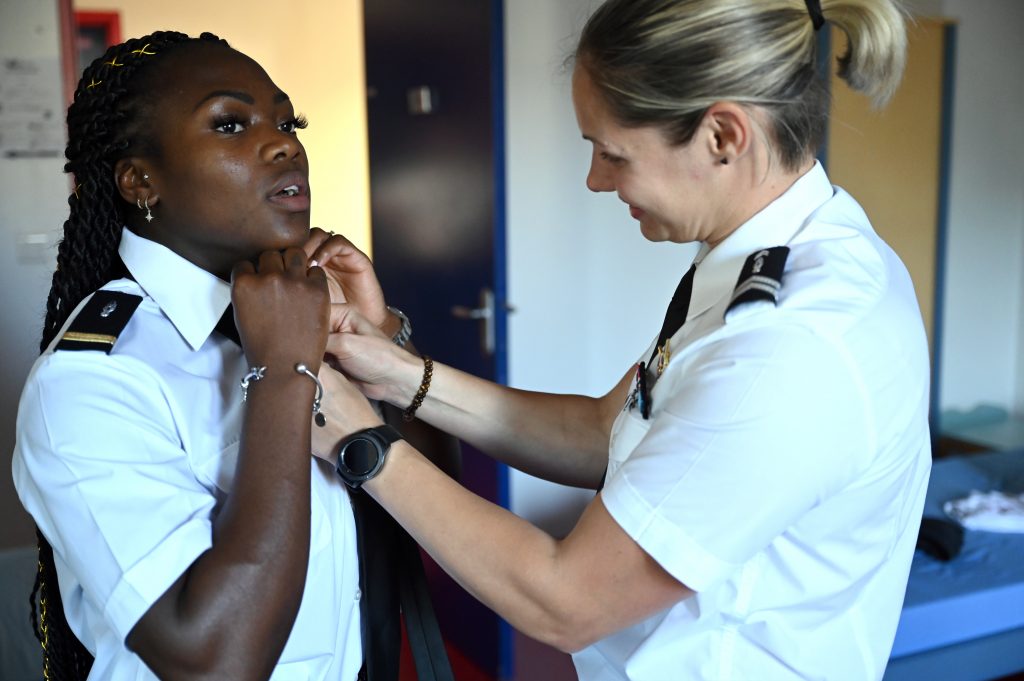24 hours with Clarisse Agbegnenou

After winning gold in Tokyo, the judo champion is preparing to receive a coaching diploma from HEC Paris Executive Education in October. Quite a comeback for the kid from Asnières who didn’t like school. We followed her to Ariège, where she serves as a charming ambassador for her sport and the French Army, which has enlisted her like other elite athletes.
9:00 AM, Wake-up in Toulouse
After her shower, Clarisse skips the hotel breakfast buffet. No pastries, eggs, or cheese for the Olympic champion in the women’s half-middleweight category (under 63 kilograms) at the recent Tokyo Games. “I never eat anything in the morning,” she says, boasting the most impressive record in women’s judo: in addition to the two gold medals she brought back from Japan, she has already won the World Championships five times and collected as many European titles since 2013. “You have to listen to your body,” Clarisse adds when asked about this departure from the supposed standards of sports nutrition, especially at the elite level. There’s no morning jog either for muscle wake-up. “I’m on vacation,” the new French star of the mats declares with a disarming smile. The champion arrived in the “pink city” the day before for a day of representation in line with her status as an ambassador of her sport and her employer, the French National Gendarmerie, where Clarisse holds the rank of warrant officer. She is expected this afternoon in Foix, Ariège, for the closing of the French Military Judo Championships. In the meantime, she has some free time!
11:00 AM, Brunch in Châteauroux
Accompanied by Nadia Benabdelouahed, a former high-level judoka turned manager, Clarisse has arranged to meet up with some friends she met while she was a resident at the Châteauroux high school, which houses the “French Pole” of the French Judo team. “We did a lot of mischief together, those were the best three years of my life,” recalls the former mischievous kid who grew up in Asnières and wasn’t afraid to fight with boys. “I didn’t like school, Nadia gave me math tutoring,” remembers the champion. Despite her severe appearance accentuated by her short haircut, the teacher of mixed Breton and Kabyle origin (as Nadia puts it) didn’t hesitate to scold the spirited teenager of Togolese origin: “You won’t make a living from judo !” Clarisse still follows Nadia’s advice, who accompanies her everywhere like her shadow. “We speak candidly, and sometimes we clash, but it never lasts long,” says the forty-something who plays the role of a real coach outside the relaxed athlete’s environment. Clarisse eventually obtained her high school diploma, passed professional qualifications to become a sports educator, and signed a CDD as an elite athlete with the Gendarmerie, earning a net salary of €1,300 per month, along with lodging and meals in a regiment in Fontainebleau. “There aren’t many of us, but it’s good for the mind; we feel safe,” says Clarisse. Like her, ten other gendarmes were part of the delegation of 378 athletes who participated in the Tokyo Olympics.
1:30 PM, Center Stage in Ferrières
The Jean Duroux high school in Ferrières is adjacent to the sports hall built in this small suburban town in Ariège. The dormitory of this professional establishment serves as the base camp for around a hundred military personnel from all over France who have come for their French championship. Uniforms, judo gis, and military fatigues intersect through the small door in the fence separating the school from the gymnasium. In a simple room with two beds, Clarisse puts on her “fighting attire“: a judo gi adorned with five stars for her world titles, her name in large characters on the back, and the black belt that she wears on all occasions, except in international competitions where it is not allowed. Her two gold medals are casually placed on the mattress, next to her gendarmerie epaulets. “Without judo, I would have never become a soldier,” says the champion, who has just learned that she has been promoted, a change in rank she wasn’t aware of. While she openly admits that she doesn’t have a strong desire to wear a képi on her long braided hair her whole life, Clarisse is proud to have “brought a medal for the country.” More than her multiple world titles, the first place she achieved in Tokyo against her Slovenian rival who had beaten her in the final in Rio represents, in her eyes, the most beautiful reward. “It’s the medal of the universe !” Approaching her 30s, she is already looking ahead to the next Olympic Games in Paris in 2024. “It’s going to be magnificent.” Like Teddy Riner, her male counterpart, she envisions defending her Olympic title in four years. She had been chosen to carry the French delegation’s flag in Tokyo and holds unforgettable memories of it. Clarisse had almost quit the competition upon learning of the postponement of the Games to 2020. The champion had then fallen into a depression that she now openly discusses. “Perhaps it’s also for my doubts that I was chosen,” says the athlete who is pursuing a training program at HEC to become a “life coach” at the end of her career. Clarisse is set to earn her diploma in October, but she’s not ready to hang up her judogi.
3:00 PM, Revisiting Childhood on the Tatami

The appearance of the champion, who aspires to dethrone Teddy Riner in the minds of the French, is well-organized by the event organizers in the small gymnasium in Ferrières, chosen over the Foix Dojo, which was deemed too small for the occasion. A ruddy officer in a judo gi has been warming up the crowd on the microphone for several minutes when the sound system finally blares the music from the movie “Rocky 3” at full volume: the Olympic champion makes her entrance, arms raised. The judoka has also taken up boxing to improve her physical fitness, but she doesn’t compare herself to Sylvester Stallone. Stylish, she has painted her nails with nail polish, both on her hands and feet. She didn’t remove her earrings when stepping onto the tatami. The demonstration announced on the program turns into an exhibition. Alongside Audrey Tcheuméo, another judo champion requisitioned for the occasion, they pose for photos amidst a hundred kids from the entire region. The children were invited by the military to join the ranks for this grand finale. With her Bondy-like charm, Audrey competes with Clarisse in the role of a French judo “M’Bappé“: they’re both black, come from the Parisian suburbs, and are cool! The two champions take countless selfies on the edge of the tatami, which is invaded by the kids, who perform warm-up moves with the towering soldiers from various military units, all dressed in judo gis. There isn’t a square inch of free space for actual matches, but that’s not the point. Clearly delighted, Clarisse reunites with her former coach from Asnières, who had spotted her when she was still in primary school. “We offered elementary school children introductions to different sports,” recalls Mohammed Zouarh, a former sports director from the Hauts-de-Seine region, now a member of the national Judo federation. The retiree closely followed the promising suburban girl’s career, who was considered too belligerent by her mother and teachers. The Olympic champion is thrilled to be in the midst of the young people from Ariège who are trying to bring down the benevolent soldiers who are built like wardrobes. “I would have been delighted to have such an experience when I was a little girl,” Clarisse points out her own difficulties in finding her path in school; “it would be great if career counselors did a bit of ‘coaching’ by listening to children before passing judgment.” The question is rightfully raised: can coaching be a new path for students struggling with teachers in the French National Education system ?
4:30 PM, In Shorts at Foix City Hall
After taking a series of photos with all the youth clubs that have made the trip and an endless autograph session for the 200 participants, young and old, who patiently queue in single file in front of an Army stand, Clarisse heads back to the school dormitory to change. Clarisse has an appointment at Foix City Hall for a formal visit. The relaxed champion will be the only one wearing shorts in the large council chamber. It’s hot, but she doesn’t indulge in the organic fruit juices prepared for the buffet. All smiles, Clarisse listens half-heartedly to the multiplying speeches. Disciplined, she stores her smartphone’s earbuds in the small bag she wears across her body as soon as she arrives at City Hall. The guided tour of the comtal castle, which overlooks the medieval center of Foix, is canceled to stick to the program, quite busy, akin to a ministerial visit. The prefect’s chief of staff decided to join the small ceremony at the last minute. Clarisse will leave Foix with a knife made by a local artisan, engraved with her name and offered by the mayor.
6:00 PM, Guest of Honor at the Award Ceremony
Another return to the small room in the Ferrières high school for one final change of attire. A poster pinned to the entrance of the gymnasium states that formal attire is mandatory for all military personnel attending the medal ceremony. Clarisse struggles to put on her gendarmerie uniform. Two fellow military colleagues help her tie her tie and check the regulation crease in her pants. “I feel comfortable in uniform, but I’d have a bit of trouble if I were asked to march in formation,” the former flag bearer of the Tokyo Games confesses. The guest of honor at the French Military Championships is not required to attend the ceremony at attention in front of the podium set up in one corner of the gymnasium. Carried away by his speech, the prefect’s chief of staff launches into an inspired tirade, praising the common values of sports and the military. In front of him, the troops stand in formation by regiment, as in a parade. Clarisse joins Nadia, who is seated at a small table. She taps on her phone but readily interrupts to respond to all the requests for selfies, which become more numerous as the medals are distributed. Gradually, the formal ceremony turns into a family gathering of athletes. In the judo world, ranks fade as soon as you put on your judogi. Everyone is on a first-name basis, and a simple soldier can throw a higher-ranking officer to the ground. The Olympic champion continues to chat, all smiles, with the last participants who linger in the gymnasium, while the majority of the troops have joined the reception served outside. Clarisse doesn’t touch the punch or sangria. She takes one final photo with Nadia in front of the tricolor flag to update her Twitter account, just as the caterer’s staff begins to serve the gala meal announced in the program. The judoka won’t touch it either. She discreetly leaves with Nadia to return to Toulouse. Freed from her military duties for the evening and well-deserved vacation.
- Clarisse Agbégnénou, était présente hier au championnat de France militaire qui se déroulait à Ferrieressur Ariège à coté de Foix. Clarisse possède le plus beau palmarès du judo féminin français de tous les temps.
Stéphane Thépot
Published by La rédaction



